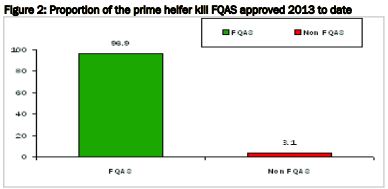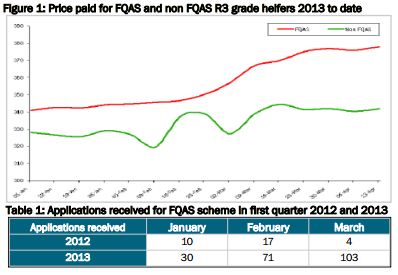



Importance of Farm Assurance Status Increasing
NORTHERN IRELAND - Renewed interest in food safety and provenance has resulted in greater awareness of the Farm Quality Assurance Scheme (FQAS). Already in 2013, 204 applications have been received as increased penalties for non FQAS animals has served to discourage supply.The Northern Ireland FQAS was first established in 1991 to provide consumers with assurances about the farm end of the production chain, according to the Livestock and Meat Commission for Northern Ireland.
The scheme is owned by LMC on behalf of the Beef and Sheep meat industry and is based on the three key pillars of animal welfare, food safety and care for the environment.
Farms are inspected every 18 months and are certified as operating to designated assurance standards including the quality of care of their animals and the environment, their freedom from the use of unnatural substances and their compliance with legislation.
Farm Quality Assurance has become a requirement of trade with major retailers and food service operators and forms an important part of their product specifications. The Farm Quality Assured status of beef and lamb has also become increasingly important in servicing the local butchery trade.
The enhanced assurances on the traceability and safety of locally produced beef and lamb provided by the NI Farm Quality Assurance Scheme have resulted in a renewed interest in the scheme from the whole supply chain. Until recently the penalty for non FQAS stock from the processors was £30 per head but how stringently this was applied was closely linked to the availability of cattle.
In recent weeks however the major processors in NI have increased penalties for non quality assured cattle to discourage supply of non-FQAS animals. Some of the plants are quoting penalties of up to £150 per head for non quality assured stock with reports that some plants will not slaughter non FQAS stock.
Figure 1 outlines the price differential for FQAS and non-FQAS R3 grading heifers in 2013 to date. Aberdeen Angus, Hereford and Organic cattle have been removed for the purposes of analysis as these attract significant bonuses which can potentially skew the data.
In the first week of January the differential was 12.9p/kg and by the week ending 12 April 2013 this had increased to 36.2p/kg. In the week ending 12 April the average R3 heifer carcase weight was 312kg which puts the average differential in monetary terms at £112.94 per head.
With the annual fee for membership of the FQAS scheme currently £55 (+ VAT) the cost of membership is now approximately half of the penalty for one non FQAS animal. With this increase in the importance of Farm Quality Assured status at point of slaughter there has been a marked increase in the number of applications to join the scheme as outlined in Table 1.
In March 2012 4 applications were received to join the scheme and in March 2013 this increased to 103 applications received. It is however worth noting that the largest majority of prime cattle
presented for slaughter already qualify to carry the Farm Quality Assured logo.
In the year to date 96.9 per cent of all heifers slaughtered have Farm Quality Assured as indicated in Figure 2. If we consider the heifer kill on a week by week basis for the year to date it has been as high as 98.5 per cent.
The proportion of the steer kill qualifying for FQ status for the year to date was slightly higher at 97.9 per cent with 99.0 per cent of the kill qualifying for the logo in particular weeks.
The percentage of cows which are FQAS at point of slaughter has traditionally lagged behind prime
cattle.
However the strong market signals from the processors in recent months in terms of the increased penalties for non FQAS stock have highlighted the importance of FQ status on all categories of livestock. As a result the number of NI dairy farmers seeking to join the NIBL FQAS has increased in recent months.
TheCattleSite News Desk




